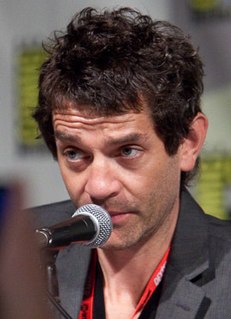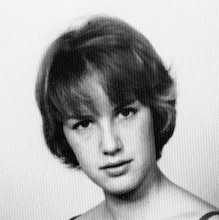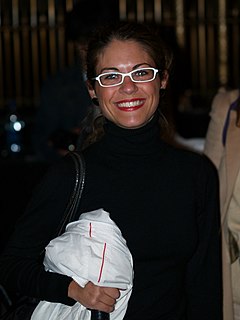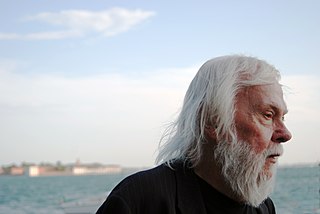Top 814 Museum Quotes & Sayings - Page 14
Explore popular Museum quotes.
Last updated on November 8, 2024.
What I think is dreadful about art is the way it's related to the money afterward. Not when you do it... But after that, it's like 5,000 rich people have access to it. A movie, even though it can be a bad movie or a good movie, it is more democratic. The people who buy my films, the people who buy my installations it's sometimes a foundation or a museum. When it's a foundation, it's related to very, very, very rich people - who are your enemies! Your enemies are feeding you. But you're not meeting them. So it's a very strange thing.
Her library would have been valuable to a bibliophile except she treated her books execrably. I would rarely open a volume that she had not desecrated by underlining her favorite sections with a ball-point pen. Once I had told her that I would rather see a museum bombed than a book underlined, but she dismissed my argument as mere sentimentality. She marked her books so that stunning images and ideas would not be lost to her.
Today it's not strange to see an artist 30 years old having her first retrospective! Different time, different speed. After having been the key point of recognition for an artist, the museum today is just another place to experiment and work, like we can do in any art fair. The king or queen of the moment is completely ignored and replaced by the new one a few years later. Contemporary novelty in art disappears faster than the seasonable changes of the fashion designs.
Some make their worlds without knowing it. Their universes are just sesame seeds and three-day weekends and dial tones and skinned knees and physics and driftwood and emerald earrings and books dropped in bathtubs and holes in guitars and plastic and empathy and hardwood and heavy water and high black stockings and the history of the Vikings and brass and obsolescence and burnt hair and collapsed souffles and the impossibility of not falling in love in an art museum with the person standing next to you looking at the same painting and all the other things that just happen and are.
Great works of art can be produced in barbarous societies - in fact the very narrowness of primitive society gives their ornamental art a peculiar concentration and vitality. At some time in the ninth century one could have looked down the Seine and seen the prow of a Viking ship coming up the river. Looked at today in the British Museum, it is a powerful work of art; but to the mother of a family trying to settle down in her little hut, it would have seemed less agreeable - as menacing to her civilisation as the periscope of a nuclear submarine.
After dinner or lunch or whatever it was -- with my crazy 12-hour night I was no longer sure what was what -- I said, "Look, baby, I'm sorry, but don't you realize that this job is driving me crazy? Look, let's give it up. Let's just lay around and make love and take walks and talk a little. Let's go to the zoo. Let's look at animals. Let's drive down and look at the ocean. It's only 45 minutes. Let's play games in the arcades. Let's go to the races, the Art Museum, the boxing matches. Let's have friends. Let's laugh. This kind of life like everybody else's kind of life: it's killing us.
Thinking about something is like picking up a stone when taking a walk, either while skipping rocks on the beach, for example, or looking for a way to shatter the glass doors of a museum. When you think about something, it adds a bit of weight to your walk, and as you think about more and more things you are liable to feel heavier and heavier, until you are so burdened you cannot take any further steps, and can only sit and stare at the gentle movements of the ocean waves or security guards, thinking too hard bout too many things to do anything else.
What I am trying to say is that it is not without any value. The value of copies is that they can direct us towards the original. I was recently at the Louvre Museum and I was filming people who were viewing the Mona Lisa. I noticed the number of ordinary people, astonished, mouths agape, standing still for long stretches looking at the work, and I wondered, "Where does this come from? Are these people all art connoisseurs?" They are like me; through the years, we've seen this work in our schoolbooks or art history books, but when we stand before the original, we hold our breath.
Mary is God's masterpiece. Have you ever walked into a museum where an artist was displaying his work? Can you imagine him being offended if you were viewing what he considered to be his masterpiece? Would he resent your looking at that instead of at him? 'Hey, you should be looking at me!' Rather, the artist would receive honor because of the attention you were giving his work. And Mary is God's work, from beginning to end.
In the year 2000, the solar water heater behind me, which is being dedicated today, will still be here supplying cheap, efficient energy. A generation from now, this solar heater can either be a curiosity, a museum piece, an example of a road not taken, or it can be just a small part of one of the greatest and most exciting adventures ever undertaken by the American people: harnessing the power of the Sun to enrich our lives as we move away from our crippling dependence on foreign oil.
I'm really fascinated by how the mob ethos permeates places like Las Vegas and Chicago. I have the book set in Las Vegas and Chicago for pretty specific reasons, some of which are that in both cases the mob history has become a tourist attraction - I'm actually doing a book signing in Las Vegas at The Mob Museum, which I am positively giddy about! - and I find that especially unusual. If you don't call these people "the Mafia" they're just a band of psychopaths killing people for profoundly dumb reasons.
I would want to keep that in a little glass sphere, perhaps in the corner of my living room, lit up. But, I think that's an extremely expensive rig. The costumes were crazy expensive, beyond anything they could afford to give you, to take away. They're going to be in a museum of some kind, on display until they get the go for Tron: Legacy 2. It would have been awesome to keep, though. I don't think there was anything that they could afford to let go. I probably would have been arrested.
My mother's a genius. She just kept feeding me art on whatever we had; paper plates, silver platter, didn't matter. You know, she just kept feeding it to me. So we went to see all kinds of theater. We would go to the art museum pretty much every Sunday, and I would watch her. She let me know that art was supposed to touch.
I’m curious about things that people aren’t supposed to see—so, for example, I liked going to the British Museum, but I would like it better if I could go into all the offices and storage rooms, I want to look in all the drawers and—discover stuff. And I want to know about people. I mean, I know it’s probably kind of rude but I want to know why you have all these boxes and what’s in them and why all your windows are papered over and how long it’s been that way and how do you feel when you wash things and why don’t you do something about it?
You know, also I, you know, I was on those birth control pills and my breasts were like, they hurt... and, you know, it was like they blew up like. You know, they wouldn't fit into any of my dresses. I had to quit taking those birth control pills... This was like - I mean they were like, I thought they should be photographed really... So they were, for immortality. (On being photographed nude playing chess with Marcel Duchamp at Duchamp's 1963 retrospective at the Pasadena Museum of Art.)
Greetings, conversationalists across the fruited plain, this is Rush Limbaugh, the most dangerous man in America, with the largest hypothalamus in North America, serving humanity simply by opening my mouth, destined for my own wing in the Museum of Broadcasting, executing everything I do flawlessly with zero mistakes, doing this show with half my brain tied behind my back just to make it fair because I have talent on loan from ... God. Rush Limbaugh. A man. A legend. A way of life.
My teacher introduced me to this photographer Eugène Atget. He was a French photographer in the late 1800s up until 1927 in Paris. He didn't consider himself an artist, but he was probably one of the artists of the 20th century. This guy documented all of Paris during those years. It's unbelievable. The books are phenomenal. The Museum of Modern Art has all his stuff now and [American photographer] Berenice Abbott saved his work. Not very much is known about his life, but the work is unreal and it totally spoke to me. He was the only artist for a number of years that I cared about at all.
Italy will start the future. Because in the last 20, 20 years, Italy discussed only about the past. "Oh, the past is wonderful in Italy." Look, look Palazzo Vecchio. The most beautiful place in the world, in my opinion, I think this is incredible place. But the past is not sufficient. Is not enough. We need the future. Because we are Italians. And Italy is not only a museum.
I shall never forget what I saw at the Museum of Modern Art: in a spotless schoolroom, fifty little girls painting away at tables covered with brushes, pots, tubes, bowls, staring into space and sticking out their tongues like the clever animals that ring a bell, tongues lolling and eyes vague. Teachers supervise these young creators of abstract art and slap their wrists if what they paint represents something and dangerously inclines toward realism. The mothers - still at the Picasso stage - are not admitted.
I didn't understand art, until one day Tom Brady took me to the museum, and we looked at the Picasso, and he said, 'Rob, that's a touchdown.' We looked at the Rembrandt and Tom said, 'Rob, that's another touchdown.' We looked at the Vermeer and Tom said, 'Rob, that's another touchdown.' And I said, 'No, Tom, that's just a field goal.'
The folks who want to build this mosque, who are really radical Islamists, who want to triumphfully prove they can build a mosque next to a place where 3,000 Americans were killed by radical Islamists. Those folks don't have any interest in reaching out to the community. They're trying to make a case about supremacy... This happens all the time in America. Nazis don't have the right to put up a sign next to the Holocaust Museum in Washington. We would never accept the Japanese putting up a site next to Pearl Harbor.
Everybody's a racist. It's the one human trait that makes us all exactly the same. Deep down, we only like people who are exactly like us. And it doesn't matter. White. Black. Red. Yellow. Purple, uh oh, the purple people, are the worst. Man. All prejudiced and birth marky. But, we've got to learn to get past our differences. I learned that at the museum of tolerance. After my dad beat the crap out of a guy over a parking spot.
Fashion went from being much more rarefied to being more accessible. Now everything is changing in the art world, too: even the highest level of institutions are becoming more aware of the general public, like the McQueen exhibit at the Metropolitan or the Tim Burton at the MoMA or how the Gagosian does historic Picasso shows, bringing museum quality into a gallery. Galleries are becoming more like museums, and museums are becoming more accessible. In the next decade, I think it'll be blown open: there will be a lot of shifting around in terms of how artists approach their work.
Ben remembered reading about curators in "Wonderstruck", and thought about what id meant to curate your own life, as his dad had done here. What would it be like to pick and choose the objects and stories that would go in your own cabinet? How would Ben curate his own life? And then, thinking about his museum box, and his house, and his books, and the secret room, he realized he'd already begun doing it. Maybe, thought Ben, we are all cabinets of wonders.
If you wanted to create jobs in a way that has minimal effect on the deficit but has government action, the two best things you could do are the infrastructure bank and a simple SBA-like loan guarantee for all building retrofits, where the contractor or the energy-service company guarantees the savings. So that allows the bank to loan money to let a school or a college or a hospital or a museum or a commercial building unencumbered by debt to loan it on terms that are longer, so you can pay it back only from your utility savings. You could create a million jobs doing that.
A little while ago I visited Omaha Beach for the second time in my life. In the intervening 26 years, nearly 20,000 tides had come and gone and little remains visible of the greatest military landing in man's history of endless warring. What's to be seen is mostly in a superb museum and a panoramic cemetery. The cemetery memorializes with dignity and grandeur the event and the dead, and moves one deeply. Before they die less precipitously and/or in lesser purpose, Americans who can should visit World War II's Normandy Beach. Such seeing and remembering helps a man's perspective.
On the third Friday of each month, I go to the Andy Griffith Museum. I get to meet hundreds of fans who stand in long lines for hours to meet me. Some months I don't feel too good and I think maybe I won't go, but then when I go and get to be there with so many wonderful people it always lifts my spirits and makes me feel better. I wouldn't stand in line for hours to meet me, but I'm so glad my fans do.
I wish there were fewer art dealers. I wish there were fewer auctions. I wish there were just two auctions a year. It's just too much. And at the end of the day, if you're a dealer and a professional, fine, that's your business, that's all you do. But as an individual, if you're not a dealer and it's not your business, you need time for these things. You need time to study what's happening. You need time to understand the market. You need time to go to a museum. You need time to see a show. You can't go to one every day. It's becoming a trend.
The idea was to take fine art and put it into the location of the movie scripts. The script itself is collage - some of the lines come from actual movies and I've written others to make the text work with the found image. In this way, the details of old dead guys' paintings (from the collection of the Städel Museum in Frankfurt, where this work will be exhibited in relation to the historical paintings) become illustrations of the movie scripts. I found this mélange of high art and Hollywood amusing.
There is little chance that aliens from two societies anywhere in the Galaxy will be culturally close enough to really 'get along.' This is something to ponder as you watch the famous cantina scene in Star Wars. ... Does this make sense, given the overwhelmingly likely situation that galactic civilizations differ in their level of evolutionary development by thousands or millions of years? Would you share drinks with a trilobite, an ourang-outang, or a saber-toothed tiger? Or would you just arrange to have a few specimens stuffed and carted off to the local museum?
The one thing that's missing from the 9/11 Memorial & Museum, and I don't imagine we'll see it any time soon, is that there's no memorial to the hundreds of thousands of Iraqis who died because of how the memory of 9/11 was used. Memory is a very interesting thing. We very selectively curate our story and then stop when it begins to tell other people's stories and forces us to accept some kind of culpability. One reason I write is that there's not enough Muslims writing, Pakistanis writing, not enough people of faith writing about the complexities of our experiences.
Stealing, of course, is a crime, and a very impolite thing to do. But like most impolite things, it is excusable under certain circumstances. Stealing is not excusable if, for instance, you are in a museum and you decide that a certain painting would look better in your house, and you simply grab the painting and take it there. But if you were very, very hungry, and you had no way of obtaining money, it would be excusable to grab the painting, take it to your house, and eat it.
perhaps I possess a certain Midwestern sensibility that I inherited from my mother and her parents, a sensibility that Warren Buffet seems to share: that at a certain point one has enough, that you can derive as much pleasure from a Picasso hanging in a museum as from one that's hanging in your den, that you can get an awfully good meal in a restaurant for less than twenty dollars, and that once your drapes cost more than the average American's yearly salary, then you can afford to pay a bit more in taxes.
When I train, I love to take time off and fly to the Natural History Museum or an exhibition. I just love that. When you know your past, it will help you with your future… That’s why most of my friends are not fighters. Most of my friends are nerds like me. That’s why I have a hard time finding a girlfriend. I need someone to talk science with. I’m married to my work right now. But you never know. One day I could wake up and just do something different. Life is so unpredictable.
































